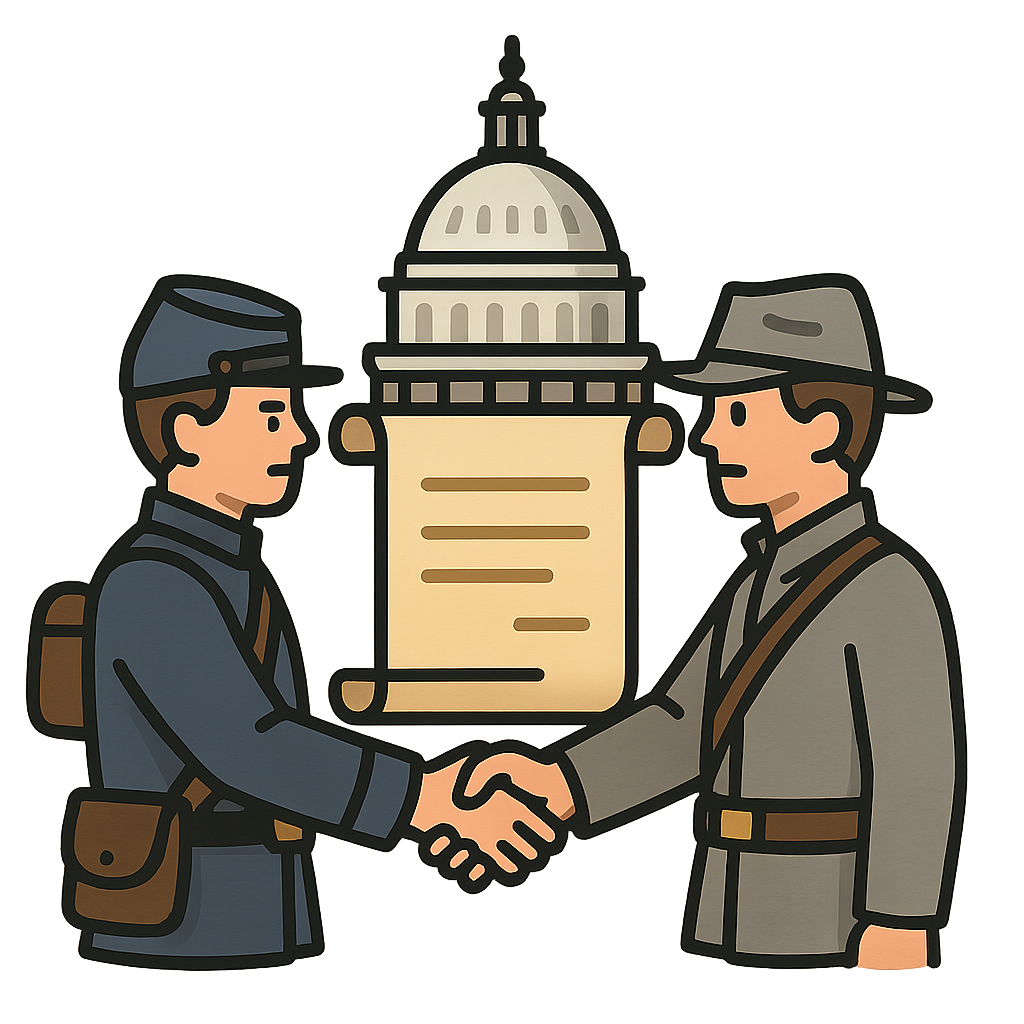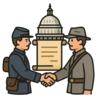A House Divided: My Story of the Civil War
My name is Abraham Lincoln, and there has been nothing I have loved more dearly than the United States of America. I have always believed in the promise made when our nation was born, the profound idea that 'all men are created equal.' It is a principle worth defending with every fiber of one's being. Yet, in my time, this beautiful ideal was threatened by a deep and painful disagreement that was tearing our country apart. The issue was slavery, a terrible practice that one part of our country defended while the other knew it was a moral stain on our nation's soul. I watched with a heavy heart as this argument grew louder and more bitter, threatening to shatter the Union I had sworn to protect.
I often said that 'a house divided against itself cannot stand.' I saw our great nation as that very house, with its foundations cracking under the strain of this conflict. It pained me deeply to see brothers turn against brothers. My worst fears were realized when, one by one, the southern states chose to leave the Union. They formed their own government, which they called the Confederacy, believing it was the only way to protect their way of life, including the institution of slavery. My goal was always to keep our family, our nation, together. But on the morning of April 12, 1861, the first shots were fired by Confederate forces at a Union fort in South Carolina called Fort Sumter. The war had begun, and a profound sadness settled over me. The house was no longer just divided; it was at war with itself.
Leading a nation during such a time was a burden heavier than any one person should have to bear. The years that followed were long, bloody, and filled with uncertainty. Every day, I read reports from the battlefields and letters from mothers, wives, and soldiers themselves. Their stories of bravery and loss weighed on me constantly. I rarely slept, pacing the halls of the White House at night, wondering how I could bring this terrible conflict to an end and preserve the Union our forefathers had fought so hard to create. My primary objective was always to save our country from breaking apart permanently. It was a monumental task, and there were many moments when victory seemed impossibly far away. Generals made mistakes, battles were lost, and the number of casualties grew ever higher. Yet, through it all, I held onto the belief that our nation was a single, indivisible entity, and that it was my sacred duty to see it whole again.
A significant turning point came from a decision that I knew would change the course of our history forever. For a long time, the war had been fought solely to preserve the Union. But I came to understand that we could not build a truly whole nation while millions of people remained in bondage. So, I drafted a document of immense importance: the Emancipation Proclamation. On January 1, 1863, I issued the proclamation, declaring that all enslaved people in the Confederate states were, and forever would be, free. It was more than a military strategy; it was a promise of liberty and a redefinition of our nation's purpose. The war was now also a fight for freedom. Later that year, in November 1863, I traveled to Gettysburg, Pennsylvania, the site of a horrific but pivotal battle that had occurred just months before. The ground was still healing from the violence. I was asked to give a few remarks to dedicate a cemetery for the soldiers who fell there. My speech was short, but I spoke from my heart about our nation being 'conceived in Liberty, and dedicated to the proposition that all men are created equal.' I prayed that the sacrifices made there would lead to a 'new birth of freedom,' ensuring that government 'of the people, by the people, for the people, shall not perish from the earth.'
The final years of the war were grueling, but the tide had turned. Under the steady leadership of General Ulysses S. Grant, the Union armies pressed on. Finally, on a spring day, April 9, 1865, Confederate General Robert E. Lee surrendered his army to General Grant at a small home in a village called Appomattox Court House. The fighting was over. A wave of relief washed over me, but it was not a moment for celebration or triumph. It was a moment for solemn reflection and the beginning of an even greater challenge: healing our wounded nation. The task ahead was to reunite the states and rebuild the South, not as a conquered enemy, but as part of our American family.
In my second inaugural address, I shared my vision for our future. I urged my fellow countrymen to move forward 'with malice toward none, with charity for all.' I believed we had to bind up the nation's wounds, to care for the soldiers, the widows, and the orphans, and to do all we could to achieve a just and lasting peace. There could be no room for revenge or hatred if we were to become one nation again. The cost of the war was immense, a price paid in blood and sorrow. But from that terrible sacrifice, our Union was preserved, and slavery was finally abolished. Our nation was reborn, stronger and more committed to the promise of liberty for all. The work of creating a more perfect nation is never truly finished, but my greatest hope was that we had laid a new foundation of unity and freedom upon which future generations could build.
Reading Comprehension Questions
Click to see answer



